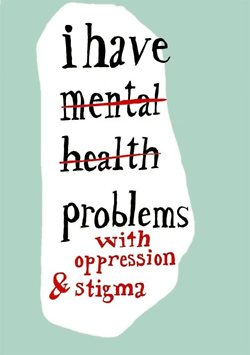By Karen Nickel
Dialog Reporter
Mental illness is caused by a personal weakness. False. Negative stereotypes, such as this, or the more violent media representations of the dangerous mentally ill patient, can lead people to believe that this is what mental illness looks like. These beliefs contribute to the stigma experienced by persons living with mental illness and their loved ones and contribute to the way they are treated by society.
Sandra Hohener, public educator from the Canadian Mental Health Association, gave a workshop on “Mental Health and Stigma”. She explained how discrimination and negative attitudes can lead to belittling and violence towards persons with mental health issues; a form of oppression she referred to as “mentalism”. Mentalism leads to social stigmatization, according to Hohener, that “is based on stereotypical and uninformed impressions or characterizations of people living with mental illness” and can, “lead to exclusion through individual or group prejudice”.
Negative emotions about mental illness range from fear to shame and can lead people to believe that persons with mental illnesses are dangerous, or alternately, somehow incapable. Hohener said, “one negative news story can lead to a fearful idea being implanted in people’s minds, with each successive story adding onto that fear”.
According to Hohener, “those who have a mental illness are three to four times more likely to be victimized rather than victimize others”.
Without learning the truth about mental illness these stereotypes continue to adversely affect people’s lives.
Impacts of being labelled with a mental disorder can be devastating to some people due to this stigma. People decide they don’t want to seek help, or they are discriminated against in areas of employment, housing and services; they often internalize the stigma and blame themselves for something they never asked for and have no control over.
Students have many pressures placed upon them; papers, exams, family, relationships and the push for high grades can feel overwhelming. The anxiety is a concern for most students as is depression.
In Hohener’s lecture, she mentioned that 30 per cent of college students felt “so depressed that they found it difficult to function”. She stated that “one in five people develop a mental illness”; meaning in each class, you interact with at least one person with mental health challenges. Knowing that, will you treat them worse because of it? What if the person next to you treated you differently? That’s the power of stigma.


